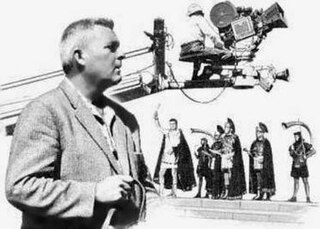Related Research Articles

Ian MacDonald was an American actor and producer during the 1940s and 1950s. He is perhaps best known as villain Frank Miller in High Noon (1952).
Frank Skinner was an American film composer and arranger.
Paul Sawtell was a film score composer active in the United States.

Steven Geray was a Hungarian-born American film actor who appeared in over 100 films and dozens of television programs. Geray appeared in numerous famed A-pictures, including Alfred Hitchcock's Spellbound (1945) and To Catch a Thief (1955), Joseph L. Mankiewicz's All About Eve (1950), and Howard Hawks' Gentlemen Prefer Blondes (1953). However, it was in film noir that be became a fixture, being cast in over a dozen pictures in the genre. Among them were The Mask of Dimitrios (1944), Gilda (1946), The Unfaithful (1947), In a Lonely Place (1950), and The House on Telegraph Hill (1951).

Don Haggerty was an American actor of film and television.
Frederick Francis Sears was an American film actor and director.

Russell Metty, A.S.C. was an American cinematographer who won the Academy Award for Best Cinematography, Color, for the 1960 film Spartacus.

Manuel Esperón González was a Mexican songwriter and composer. Along with the famous Mexican author Ernesto Cortazar, Esperón cowrote many songs for Mexican films, including "¡Ay, Jalisco, no te rajes!" for the 1941 film of the same name, "Cocula" for El Peñón de las Ánimas (1943), and "Amor con amor se paga" for Hay un niño en su futuro (1952). Other Esperón compositions have become Latin standards such as "Yo soy mexicano", "Noche plateada" and "No volveré", which was used in the first episode of the 2001 soap opera El juego de la vida. Among other performers, Pedro Infante, Los Panchos, and Jorge Negrete have made his songs well-known. His fame in the US derives from when his song The Three Caballeros was used in the Disney film The Three Caballeros (1945).
Henry Blanke was a German-born film producer who also worked as an assistant director, supervisor, writer, and production manager. He was nominated for the Academy Award for Best Picture for The Nun’s Story (1959).
Arturo Soto Rangel was a Mexican film, television, and stage actor. Soto was best known for appearing in over 250 Mexican films. He appeared in one American movie, The Treasure of the Sierra Madre, which won three Academy Awards and starred Humphrey Bogart, Walter Huston, Tim Holt, Bruce Bennett, and many other successful actors. Soto last appeared on television in 1963, where he starred in Voy de gallo.

Armando Calvo was a Puerto Rican-born Spanish actor. His father was Juan Calvo Domenech, a Spanish actor and his mother was Minerva Lespier, a Puerto Rican. Calvo worked in Spain, Italy, and Mexico appearing in ninety films between 1939 and 1984.
Carlos Orellana Martínez was a Mexican actor, film director and screenwriter.

Lionel Lindon, ASC was an American film cameraman and cinematographer who spent much of his career working for Paramount.

Robert B. Williams was an American character actor from the 1940s through the 1970s. During his 37-year career, he appeared in over 150 feature films, as well as numerous film shorts, television films, and television shows. He did not break into the film business until he was in his 30s.
Paul Demange was a French film actor who had roles in over 200 films from 1933 to 1977.
Julio Villarreal was a Spanish actor who later settled and worked in Mexico. He also directed two films in the early 1930s.
Miguel Inclán (1897–1956) was a Mexican film actor. He became known for his villainous roles during the Golden Age of Mexican cinema. His sister was the actress Lupe Inclán.
Raúl Martínez Solares was a Mexican cinematographer. He began his career during the Golden Age of Mexican cinema.
Reginald Thomas Lanning was an American cinematographer. He was a cinematographer on over 100 films. Lanning died of emphysema in Woodland Hills, California, at the age of 72. He was buried in Oakwood Memorial Park Cemetery.
Henri Arius (1897–1968) was a French film and stage actor. A character actor he appeared in a large number of films in wartime and post-war France.
References
- ↑ Mayer p.211
- ↑ Savage Carmona, Mónica; Savage Carmona, Mónica (December 2015). "Legalidad y práctica del Registro Civil a mediados del siglo XIX: incidencias entre autoridades e individuos de la Ciudad de México" [Civil Registry legality and practice in the mid-nineteenth century: incidences among authorities and individuals from Mexico City]. Signos históricos (in Spanish). 17 (34): 8–41.